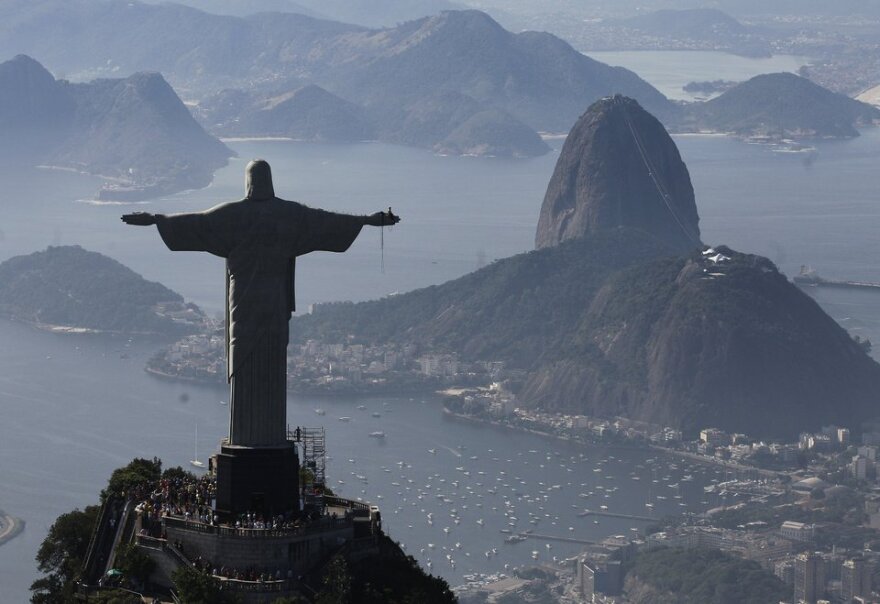At a Brazilian restaurant in Doral called Brazuca’s, Danilo Leão is whipping up his most popular dish, feijoada. Pronounced fay-ZHWAH-dah, it's a heavenly stew of black beans, meats and spices created centuries ago by Brazilian slaves.
“Whatever the rich people didn’t eat they threw away,” Leão tells me as he tosses Brazilian linguiça sausage into a simmering pot.
“The slaves mixed it up, everything. That’s feijoada. Very carioca.”
Carioca. Meaning: from Rio de Janeiro – the iconic Brazilian beach city that’s hosting the Summer Olympics starting Friday.
RELATED: How Brazil's Hubris Jeopardized Its World Cup
Leão is a carioca, a Rio native, who came to Miami to learn to be a commercial pilot but became a chef instead. Three years ago he opened Brazuca’s – which means “a Brazilian guy who lives outside Brazil.”
“Everybody says my food’s like their mother's back in Rio de Janeiro,” he says chuckling. “I guess it’s most important that I put in a lot of love.”
But Leão and his carioca customers admit these Olympic Games – the first ever to be held in South America – are testing their love for Rio de Janeiro.
Rio is unique; I think it's paradise. But Rio politicians just take care of themselves and leave everything else for the last minute. That's very wrong. -Danilo Leao
They're not the kind of Brazilian expats Miamians usually read about. They don't own million-dollar condos in Brickell. But they want the Olympics to show the world their birthplace isn’t just about Carnaval – that it's also about competence.
So far it hasn’t worked out that way.
“Rio politicians just take care of themselves and leave everything else for the last minute,” says Leão. “That’s very wrong.”
Like the soccer World Cup Brazil hosted two years ago, the Rio Olympics look less than ready. A key $3 billion subway extension was only finished a couple days ago – and it doesn’t even reach the Olympic Village for the 10,000 athletes, which itself is being criticized for shoddy construction.

Worse, Guanabara Bay – the site for rowing and sailing events – was never cleaned up as promised. It’s still rife with sewage pollution.
“To tell you the truth, I’m kind of ashamed,” says carioca and Brazuca’s regular Fabio de Deus, who lives in Doral but grew up in Rio’s Barra da Tijuca district, where the Olympic Park has been built.
“My family’s there, and it’s a pity, because they want to show a different kind of Carnaval – the union of the nations, races.”
Still, De Deus says cariocas know how to make up for what their leaders screw up – starting with Rio de Janeiro’s famously jovial hospitality.
“There’s no other city where the population is so warm, friendly,” he says. “You’re gonna see somebody get close to you just to say, ‘Hello, how are you my friend?’”
Which is why ClaydeCouto insists: “I think it will be better than everybody expects.”
Couto splits her time between Doral and her native Rio de Janeiro. She just returned from Rio – and points out Brazil’s World Cup turned out fine even after disastrous preparations. She says even Rio’s notorious crime should be dormant.
“Eighty-thousand police just arrived over there,” says Couto. “Security looks good.
“So, yes, everything is late, everything looks like a mess. But it will be everything OK in Rio de Janeiro. It’s beautiful. Beautiful.”
PROBLEMATIC PARADISE
Leão agrees. Sensual bossa nova music plays in his restaurant 24/7. On the back wall is a mural showing Rio de Janeiro’s colossal Christ the Redeemer statue looking down from Corcovado mountain on sublime Guanabara Bay.
It’s all a reminder that even if these Olympics don’t turn out OK, they’ll still showcase one of the most beautiful places in the world.

“Rio is unique,” says Leão. “I think it’s a paradise.”
But a problematic paradise. Because Leão and his customers are largely middle class, they worry about how the Olympics will affect poorer Rio residents like those in large slums known as favelas. On that score, most cariocas say Rio’s leaders failed.
“For the cariocas in the city who will have to live with the Rio that’s left over after the Olympics, this was not a good deal,” says Brazilian-born journalist Juliana Barbassa, author of “Dancing With the Devil in the City of God: Rio de Janeiro on the Brink.”
“The majority of the investment that did happen went to already wealthy neighborhoods,” Barbassa told me from Rio. “A lot of the investment that would have improved the quality of life for lower-income cariocas was not implemented. So the real tragedy here is the missed opportunity. This was supposed to be a different Brazil.”
But it’s the old Brazil. In fact, these Olympics are taking place amid some of the worst political and economic crises in Brazil’s history.
Even so, this is still the Olympics. And they’re worth coming to see on Danilo Leão’s big-screen TV. While you’re eating some really good feijoada.



